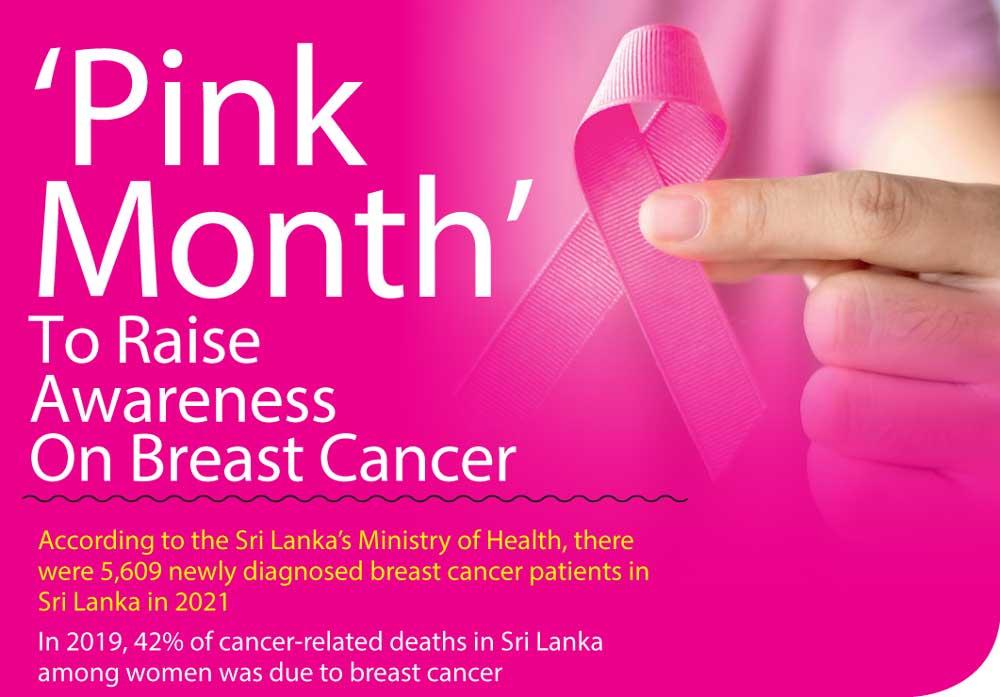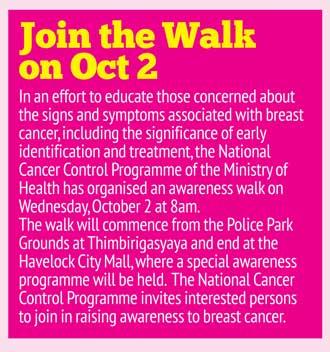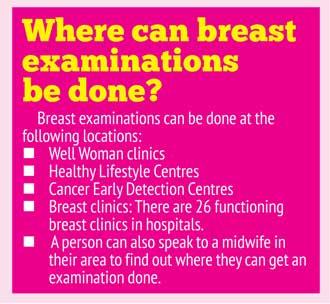Reply To:
Name - Reply Comment

October is globally recognised as the ‘pink month’, in an initiative to raise awareness about breast cancer, the leading cancer among females
 October is globally recognised as the ‘pink month’, in an initiative to raise awareness about breast cancer, the leading cancer among females. According to the latest data issued by Sri Lanka’s Ministry of Health, there were 5,609 newly diagnosed breast cancer patients in Sri Lanka in 2021, with 5,485 being females and 124 males. In 2019, 42% of cancer-related deaths in Sri Lanka among women was due to breast cancer.
October is globally recognised as the ‘pink month’, in an initiative to raise awareness about breast cancer, the leading cancer among females. According to the latest data issued by Sri Lanka’s Ministry of Health, there were 5,609 newly diagnosed breast cancer patients in Sri Lanka in 2021, with 5,485 being females and 124 males. In 2019, 42% of cancer-related deaths in Sri Lanka among women was due to breast cancer.
A three-fold increase in cancers
|
Dr. Hasarali Fernando, Consultant Community Physician of the National Cancer Control Programme
|
Speaking to the Daily Mirror, Consultant Community Physician of the National Cancer Control Programme, Dr. Hasarali Fernando, noted a three-fold increase in cancer diagnoses reported by treatment centres in Sri Lanka since 2005.
In 2005, the cancer incidence in Sri Lanka was 13,372, where 6,058 were male and 7,314 were female, while by 2021 the overall figure had increased to 37,753, where 17,583 were male and 20,171 were female. This means that a staggering 103 patients were diagnosed with cancer per day in 2021. Meanwhile, a total of 2,753 cancer-related hospital deaths were reported in 2005, while a total of 5,112 were reported in 2021.
Dr. Fernando noted that the actual numbers could be higher as the data provided in the reports are based on cases reported to the treatment centres of the Ministry of Health. “There is a certain number that is unreported too as there are patients who do not seek treatment at hospitals, but go for other treatments such as Ayurveda,” she said.
Among men, the most common types of cancers are oral cancer (lip, tongue and mouth), cancer in the trachea, bronchus and lungs, colorectal cancer, and esophageal cancer. In females, breast, thyroid, colorectal, and ovarian cancers are most prevalent.
Speaking of oral cancers in men, Dr. Fernando stressed, “This cancer is common among men due to smoking, chewing tobacco, and chewing of areca nuts when chewing betel leaves. Refraining from these behaviours can help curb oral cancer by 80%”.
Rise in colorectal cancers
 The third-most common type of cancer among both males and females in Sri Lanka and globally is colorectal cancer. This cancer, also known as bowel cancer, colon cancer, or rectal cancer, is the development of cancer from the colon or rectum. In addition to a genetic predisposition, it is believed to also be caused by dietary habits; hence, this form of cancer is preventable, noted Dr. Fernando.
The third-most common type of cancer among both males and females in Sri Lanka and globally is colorectal cancer. This cancer, also known as bowel cancer, colon cancer, or rectal cancer, is the development of cancer from the colon or rectum. In addition to a genetic predisposition, it is believed to also be caused by dietary habits; hence, this form of cancer is preventable, noted Dr. Fernando.
“Consuming processed meat, processed food, fast food and junk food can lead to colorectal cancer. There is a possibility for early detection, but the issue is that when people present with rectal bleeding, the usual procedure is to treat haemorrhoids (piles); because of this there is late presentation. It is always important to screen for cancer first before treating for haemorrhoids. If detected early, colorectal cancers can be treated,” Dr. Fernando explained.
Getting screened for breast cancer
 While breast cancer cannot be entirely prevented, early detection significantly increases the chances of successful treatment, stressed Dr. Fernando. “Through self-breast examinations or clinical breast examinations, early detection of breast cancer is possible. Any female above 20 years is advised to do self-breast examinations monthly. Women between the ages of 20 and 40 years are advised to get a clinical breast examination done every 3 years. After 40 years, clinical examinations should be done annually,” she said.
While breast cancer cannot be entirely prevented, early detection significantly increases the chances of successful treatment, stressed Dr. Fernando. “Through self-breast examinations or clinical breast examinations, early detection of breast cancer is possible. Any female above 20 years is advised to do self-breast examinations monthly. Women between the ages of 20 and 40 years are advised to get a clinical breast examination done every 3 years. After 40 years, clinical examinations should be done annually,” she said.
However, she added that sufficient examinations are not done by Sri Lankan women. “It is difficult to comment whether people are not getting tested because they are unaware or because they are fearful of being diagnosed with cancer.” Dr. Fernando also mentioned that many women feel reluctant to get examined out of shyness. “Clinicians say that old women come with ulcers in their breasts, which is a very late stage in breast cancer. They are so shy that they don’t want to even tell their daughter that there is an issue in their breast. So those sorts of issues hinder women from getting a breast examination done,” she said.
 “There is a certain number that is unreported too as there are patients who do not seek treatment at hospitals, but go for other treatments such as Ayurveda,”
“There is a certain number that is unreported too as there are patients who do not seek treatment at hospitals, but go for other treatments such as Ayurveda,”
- Dr. Hasarali Fernando, Consultant Community Physician of the National Cancer Control Programme
She also pointed out that women often prioritise other responsibilities over their health. “By the time they decide to get checked, it’s often too late,” she said.